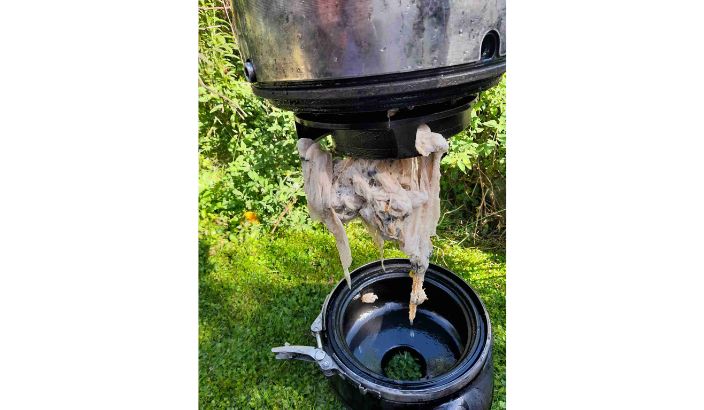Councillors consider wet wipe ‘rebellion’


Flushed wet wipes and cooking oil tipped down the sink are inflating an almost $30,000 wastewater bill for Tasman ratepayers. Photo: Supplied/TDC.
Frustrations about flushed wet wipes costing ratepayers thousands of dollars are reaching their boiling point in Tasman.
Of the 49 wastewater pump station blockages that occurred from January to July, 26 were caused by flushed wet wipes, and a further 8 were caused by flushed items of clothing.
The Jenkins pump station in Riwaka, which only serves around 50 properties, is responsible for 9 of the 26 wipe blockages. Flushed underwear also continues to be a problem in Māpua.
The costs of clearing only the blockages until June reached $28,900. The cost of clearing last year’s blockages exceeded $39,000.
This year’s growing cost comes as flushed wet wipes, and oil and grease, caused a sewerage overflow in Motueka that was notified last week.
The overflow has resulted in a boil water notice being applied to a swathe of properties southeast of Grey St who get their water from private bores.
Testing continues to determine whether contaminants have entered the shallow groundwater aquifer under the area, though initial testing is positive.
The Motueka overflow resulted in a sucker truck being sent to the area, traffic management for the truck crew, council staff time across a range of departments being taken away from focusing on different priorities, as well as investigations and water sampling.
“It is not difficult to see this one event costing ratepayers thousands possibly up to tens of thousands of dollars,” a council spokesperson said.

Councillors were frustrated by the continued issue of flushed wipes when briefed during a meeting last week.
“This wipes thing is just doing my head in,” Jo Ellis said. “It’s such a waste of money. Can we take some action now and send a letter to the relevant minister to actually get off their butt and do something about it?”
Christeen Mackenzie shared the sentiment.
“How are we, as a society, thinking bigger about how to solve this problem?” she asked.
“It's as though we just sit here passively and accept that this is acceptable, and we just carry on letting it happen… There should be a rebellion against these products being available.”
But the council’s waters and waste manager, Mike Schruer, said the Government and the wet wipe industry had taken some action.
A new Australia-New Zealand flushability standard was introduced two years ago, but Mike said the flushable wipes didn’t yet comprise the entire wipe market.
“The issue is the non-flushable wipes that you can buy, like for removing makeup and for babies,” he said.
“It’s no different to people throwing diapers down the toilet and clothing, we have an issue with people that just don't care.”
Group manager community infrastructure, Richard Kirby, said that council officers get “very upset” when there are wastewater discharges but said there are probably more blockages slowly building across the reticulation network.
“We really encourage the community to be very careful what they flush down. We’ve made this message several times,” he said.
“What frustrates me is that we have these things just randomly occurring and they happen to be more and more frequent.”
While he suggested the council could investigate a bylaw to prohibit retailers from selling non-flushable wipes and send a signal, that could result in court challenges.
Instead, he recommended further national engagement with Local Government New Zealand to lobby the Government on the issue, or with Water New Zealand, to initiate further change.
Councillors were eager for more action and directed Richard to investigate ways forward.
Only the ‘three Ps’ – paper, pee, and poo – should be flushed down the toilet, and cooking oil and grease should not be tipped down the sink.

